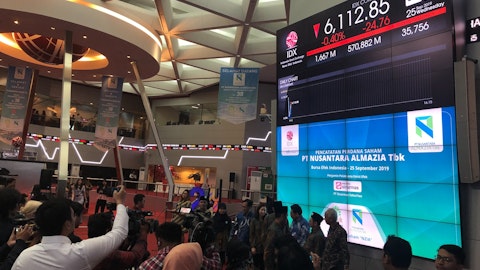Trip.com Group Limited (NASDAQ:TCOM) Q3 2023 Earnings Call Transcript November 20, 2023
Trip.com Group Limited beats earnings expectations. Reported EPS is $1, expectations were $0.71.
Operator: Good day and thank you for standing by. Welcome to Trip.com Group 2023 Q3 Earnings Conference Call. At this time, all participants are in a listen-only mode. After the speakers’ presentation, there will be a question-and-answer session. [Operator Instructions] Please be advised that today’s conference is being recorded. I’ll now like to hand the conference over to your speaker today, Senior IR Manager, Michelle Qi. Please go ahead.
Michelle Qi: Thank you. Thank you, Maggie. Thank you, everyone. Good day and welcome to Trip.com group’s third quarter of 2023 earnings conference call. Joining me today on the call are Mr. James Liang, Executive Chairman of the Board; Ms. Jane Sun, Chief Executive Officer; and Ms. Cindy Wang, Chief Financial Officer. During this call, we will discuss our future outlook and performance, which are forward-looking statements made under the safe harbor provisions of the U.S. Private Security Litigation Reform Act of 1995. Forward-looking statements involve inherent risks and uncertainties. As such, our results may be materially different from the views expressed today. A number of potential risks and uncertainties are outlined in Trip.com Group’s public filings with the Securities and Exchange Commission.
Trip.com Group does not undertake any obligation to update any forward-looking statements, except as required under applicable law. James, Jane and Cindy will share our strategy and business updates, operating highlights, and financial performance for the third quarter of 2023, as well as outlook for the fourth quarter of 2023. After the prepared remarks, we will have the Q&A session. With that, I will turn the call over to James. James, please.
James Liang: Thank you, Michelle. Thank you everyone for joining us on the call today. We are pleased to see the global travel market showing strong recovery in the third quarter. The Chinese travel market in particular has experienced a significant rebound, driven by high demand during the summer season. Our business has consistently performed well, breaking previous records in hotel and air bookings. Additionally, outbound travel is rapidly recovering, thanks to improvements in international airlift and travelers’ robust desire for international experience. So, we anticipate a continuously strong demand for outbound travel in the coming year and are committed to enhancing our partner offerings to meet this demand. We also accelerated our global business growth by expanding and scaling our global OTA platform.
While globalization remains a crucial aspect of our business, Trip.com Group recognizes the significance of AI innovation in our long-term strategy. The pandemic has accelerated the digitization of travel industry and advancements in AI technology have transformed consumer expectations. In response to this trend, we have developed our unique AI technology, which is specifically designed for the travel industry. This, combined with our extensive travel knowledge, enables us to create a reliable database of accurate travel data and provides actionable recommendations for travelers. Moving forward, we will continue to enhance our capabilities and integrate AI into all aspects of our business, providing personalized booking experiences and tailored to recommendations.
In conclusion, travel is unique and that it is an inherently human-centric experience with insatiable demand. We will continue to push forward with our globalization and AI innovation to pave the way for the Company’s accelerated growth. With that, I will turn the call over to Jane for operational highlights.
Jane Sun: Thanks, James. Good morning, everyone. As a quick overview, our net revenue in Q3 grew by approximately 100% year-over-year and has exceeded the 2019 level by 31%. The strong travel demand and robust momentum in the travel bookings that we saw in the second quarter continued to extend into the third quarter. Our business performance continued to elevate and reached the new record amounts with hotel booking increased over 97% versus last year and air bookings increased by about 70% year-over-year. In the China domestic market, travel demand remains strong. Over the past three quarters, Chinese consumers have been increasingly prioritizing travel spending over other discretionary spending. The positive trend that we saw in the second quarter continued all the way to the third quarter.
Our domestic hotel reservations grew by over 90% year-over-year and 70% versus 2019 level. Long-haul hotel bookings have been the fastest year-over-year growth rate of 133%, and our short-haul hotel bookings were also 66% above last year’s level. While Chinese travelers remained keen to explore their home country, propensity to travel abroad continued to ramp up, thanks to the steady improvement on the supply side. In Q3, while the overall Chinese outbound market recovered to only about 50% of the pre-pandemic level, Trip.com Group’s outbound hotel and air ticket to reservations have already recovered to 80% of the pre-pandemic level, continued to lead the market by approximately 30%. APAC regions such as Hong Kong, Macau, Thailand, Singapore, Korea, Japan remained top outbound destinations due to the higher recovery in flight capacity and easy visa application.
Trip to long-haul destinations such as Europe have also seen the fastest growth rate when compared to where they were in the previous quarter. Increasing number of the overseas partners are gearing up to welcome Chinese travelers. In particular, hotels in more than 15 popular destinations, including Dubai, Paris, Kuala Lumpur have offered tailored services such as Chinese language support and payment. These positive trends have enhanced the consumers’ confidence when they travel abroad. We look forward to seeing further growth in Chinese outbound travel next year. Turning to our global business, we continue to see resilience in the global travel demand, especially in APAC region, which is the key market and powerhouse of the growth. Air ticket bookings on our global OTA platform have nearly doubled year-over-year and 80% above 2019 level.
Our overall hotel bookings on the global platform also hit a new record high and more than doubled 2019 level. Following the country’s goal to promote inbound tourism and rollout of favorable policies, we have also seen triple-digit growth in inbound travel through our global platform. Travelers worldwide are increasingly opting for destination abroad, which continues to drive the global travel momentum and presents great opportunity for travel companies with global offerings. Benefiting from the positive trend, our global business continued to excel, and our focus remains on fostering organic growth in the mid to long-term. Our global OTA platform has experienced significant growth with its contribution to the growth group, steadily increasing and now representing nearly half of our total overseas business.
We see substantial potential for further expansion to serve users globally as well as significant upside for profitability. Notably, in Q3, 60% of our global booking came directly through our global mobile app. Our APAC market, we have seen 70% of the orders are booked through our mobile app, which is even higher than the global booking. To further capitalize on this opportunity, we have developed a comprehensive roadmap that leverages our strengths and resources to drive continuous growth. Our strong foothold in APAC markets coupled with our unwavering commitment to customer services enables us to deliver exceptional product and service offerings to our users. Recognizing the immense potential in APAC region, we are dedicated to further enhancing our brand awareness to solidify our market position.

Notably, we have achieved significant market share growth in key areas such as Hong Kong, Korea, Southeast Asia, and our strong product to provide a comprehensive one stop shopping service also enables us to capture some opportunities ahead. We are also applying the same strategic approach to expand to the rest of the world by leveraging our product and service capability. In terms of accommodation, we have enhanced our product capabilities by achieving a more balanced mix between our traditional strengths in long-haul and newly developed expertise in the short-haul, in response to evolving travel needs in the post-pandemic area. Our focus remains on the positive product innovation aiming to deliver great value to both our customers and partners.
Additionally, partners have the opportunity to join our TripPlus program, which enables them to connect with our high quality and loyal customers through our branded membership. Furthermore, we are expanding our user base by pushing forward with our lower tier cities penetration. With these efforts, we aimed to create — to deliver the best possible value to both of our customers and partners. As the appetite for travel continues to grow, the further AI application in travel is expected to focus on efficiency and highly personalized solution to tailor made individual travelers’ needs. This vision not only signifies the next phase of travel industry, but also underscores the profound impact of AI in making travel more convenient, personalized and memorable for everyone.
So far, we have launched a series of AI tools to refine travel booking experience. Our AI travel assistant, TripGenie enhanced the user interface with our customers by leveraging natural language users’ interface and providing actionable results. Since its launch early this year, we have seen double order conversion rate improvements and also help our users’ retention. We have also achieved remarkable self-service rate with the help of AI chatbot, which can handle numerous inquiries using text and voice accuracy to enhance this service. This streamlined approach results in improved self-service resolution. As the recovery of the travel industry is promising, we continue to embrace the sustainable — sustainability as a component of our long-term growth strategy.
We remain committed to being environmental friendly, community friendly and family friendly. First, for environmental friendly, we provide sustainable travel products dedicated to supporting and enhancing communities we are serving. We have taken significant steps to incorporate sustainable travel products into various product lines, including flight, car rentals and corporate travel. Over 16 million users have already chosen these sustainable travel options, favoring the Company’s low-carbon products. We also are focusing on low carbon hotel standard as part of our ongoing commitment to promoting our sustainable travel industry initiatives. Trip.com groups has engaged with nearly 1,000 hotel partners and launched its Low-Carbon Hotel standard initiative, which aims to encourage eco-friendly practices and facilitate a shift towards a more sustainable travel ecosystem by collaborating with these hotels.
For community friendliness initiative, we also have pushing forward with building countries retreats across the country to nurture travel talents and improve local travel services quality, while also creating job opportunities and contributing to the global common prosperity. For family friendly, we have implemented subsidy program, aiming to alleviating child birth expenses in order to support our employees to achieve work life balance. With our ongoing efforts to prioritizing these initiatives, we are proud to continue to make positive impact on society at large. In conclusion, we are encouraged by the robust travel demand across all business segments, and we anticipate this outbound travel will continue to be primarily catalyst for the growth in the short term.
Looking forward, our global business bolstered by enhanced offering and improved profitability will become the pivotal pillars in the long run. Considering these promising prospects, as well as the efficiency gain achieved during the quarter and going forward by implementing of our AI initiatives, we remain an optimistic outlook for the market and we are confident in the opportunities that lay ahead of us. With that, now I will turn the call to Cindy.
Cindy Wang: Thanks, Jane. Good morning, everyone. For the third quarter of 2023, Trip.com Group reported a net revenue of RMB 13.7 billion, representing a 99% increase from the same period last year, and a 22% increase from the previous quarter, primarily due to strong recovery in the travel market. Accommodation reservation revenue for the third quarter was RMB 5.6 billion, representing a 92% increase year-over-year and a 30% increase quarter-over-quarter, which is 36% higher than the 2019 level. Both domestic and outbound hotels have seen robust growth and outpaced the industry. Overall hotel bookings have achieved a record high and have grown over 60% above the pre-pandemic level. Transportation ticketing revenue for the third quarter was RMB 5.4 billion, representing a 105% increase year-over-year and 11% increase quarter-over-quarter, which is 44% higher than the 2019 level.
This is mainly due to robust recovery of outbound air and strong growth in domestic and global air business. Packaged tour revenue for the third quarter was RMB 1.3 billion, representing a 243% increase year-over-year and the 84% increase quarter-over-quarter, recovering to 81% of the 2019 level. Domestic packaged tour has outgrown the 2019 level while recovery in the outbound packaged tour was still lagging behind. Corporate travel revenue for the third quarter was RMB 591 million, representing a 60% increase year-over-year and remained flattish quarter-over-quarter, which is 76% higher than the 2019 level with air ticketing bookings increased by double-digit above 2019 level and hotel bookings threefold the 2019 level. Excluding share-based compensation charges, our total adjusted operating expenses were 19% higher than the previous quarter and 20% higher than the same period in 2019.
Adjusted product development expenses for the third quarter increased by 23% from the previous quarter increased by 29% compared with the same period in 2019. Adjusted G&A expenses for the third quarter increased by 9% from the previous quarter and increased by 21% from the same period in 2019. This is mainly due to increase in personnel related expenses. The increase was mainly related to performance-based bonus in recognition of the exceptional performance achieved in the quarter, while the total headcount of our product development and G&A teams was significantly lower than during the same period in 2019. Adjusted sales and marketing expenses for the third quarter increased by 17% from the previous quarter and increased by 11% compared with the same period of 2019.
The sequential increase was due to increased marketing activities that were in line with the higher seasonality. Adjusted EBITDA was RMB 4.6 billion for the third quarter compared with RMB 1.4 billion in the same period last year and RMB 3.7 billion in the previous quarter. Adjusted EBITDA margin was 34% for the third quarter compared with 21% in the same period last year and 33% in the previous quarter. Diluted earnings per ordinary share and per ADS were RMB 6.84 or US$0.94 for the third quarter of 2023. Excluding share-based compensation charges and fair value changes of equity securities investments, exchangeable senior notes, non-GAAP diluted earnings per ordinary share and per ADS were RMB 7.26 or US$1 for the third quarter. As of September 30, 2023, the balance of cash and cash equivalents, restricted cash, short-term investment, held-to-maturity time deposit and financial products was RMB 79 billion or US$10.8 billion.
Given the rapid business growth this year has significantly strengthened the group’s cash flow and we believe the Company’s share price is undervalued, as of November 20, 2023, we repurchased US$120 million of our shares and reduced our share count by 0.5% versus last year. Our Board of Directors has also approved a regular capital return policy, which is scheduled to commence in 2024. We are proud of this accomplishment as it reflects both our commitment to returning capital to shareholders and our confidence in the long-term outlook of the travel industry and our own business. To conclude, we are pleased with the continued momentum in the travel market and our team’s solid execution in the third quarter. We are well-prepared and we remain key to drive long-term growth and to maximize return for shareholders.
With that, operator, please open the line for questions.
See also Philippe Laffont Stock Portfolio: 10 Top Stock Picks and 20 Rich Countries with Best Debt to GDP Ratio.
Q&A Session
Follow Trip.com Group Limited (NASDAQ:TCOM)
Follow Trip.com Group Limited (NASDAQ:TCOM)
Receive real-time insider trading and news alerts
Operator: [Operator Instructions] Our first question comes from Brian Gong from Citi. Please go ahead, Brian.
Brian Gong: Congrats on decent third quarter results. And thanks for sharing the exciting progress of generative AI adoption at Trip.com. I have a quick question on this. Could you elaborate how the adoption of AI technology differs between our — through international platform, Trip.com and our domestic Ctrip within the group? Thank you.
James Liang: Thanks for your question. We implement a consistent AI adoption strategy across all markets, focusing on improving productivity and efficiency in marketing, engineering and customer services. Our goal is to offer users a smart AI assistant that can simplify and enhance their trip planning and the research experiences. Through natural language interfaces and actionable recommendations, we aim to help users plan their trips more effectively. Successful practices from each market will be shared and promoted across others, ultimately becoming a global standard within our organization. Thank you very much.
Operator: Next, we have Alex Poon from Morgan Stanley. Please go ahead.
Alex Poon: Congrats on a very strong quarter. For my question, could you share some details about the travel performance after the Golden Week? And how should we interpret the momentum into Q4 and into 2024? Thank you so much.
Cindy Wang: Sure. Quarter-to-date, China hotel RevPAR number and domestic air passenger volume was slightly below that of 2019, which reflects a normal seasonality post the summer. We continued to outpace the industry average growth with our domestic hotel bookings surpassing 2019 level by around 60%, and our outbound hotel and air reservations recovered to around 80% of the 2019’s level. Our global OTA platform has maintained a triple-digit growth over 2019, despite tough comparables. Look into the next year, 2024, our users’ short booking window makes it challenging for us to forecast the 2024 industry momentum. However, we are confident in our ability to consistently outpace the market growth. For the China — in terms of a different market, for the China market, we expect robust growth in the outbound travel business due to further recovery of outbound flight capacity, along with steady growth in domestic business.
And for the global market, we anticipate our global OTA platform, Trip.com, to maintain high-speed growth, while Skyscanner and other overseas brands continue to grow healthily, despite recent headwinds in the EMEA region. Thank you.
Operator: Next, we have Natalie Wu from Haitong International. Please go ahead.
Natalie Wu: Congratulations on a very solid quarter. My question is regarding the outbound. We all acknowledge that outbound will continue to be the strongest driver in short term. I’m just wondering the recovery pace of outbound flight recently seems to be a little bit slower than the market has initially expected. So just wondering is there any reason behind. Is it due to insufficient consumer capacity? So just wondering, when does the management anticipate full recovery of the outbound business? Thank you.
Jane Sun: Yes. So we’re confident in the recovery of outbound. If you look at our demand and supply side, the demand already exceeded 2019 level. However, on the supply side, there are two major hurdles. The first one is the visa application process takes a little bit longer for certain regions, such as Europe, United States, et cetera. However, after the APAC meeting, I think there will be improvements on the visa application side. The second one is the flight capacity. As of Q2 — as of Q3, the flight capacity only recovered 50%. We hope going forward the flight capacity will further improve. So, with the visa application process being improved as well as the increased flight capacity, we believe next year, outbound will grow even stronger compared to this year. Thank you.
Operator: Next, we have Simon Cheung from Goldman Sachs. Please go ahead.
Simon Cheung: I have two questions. I think in the consumer space, the trade-down seems to be a buzzword for everyone. Wondering whether you have to observe a similar trend for this trade-down, whether it’s for corporate travel or for leisure travel. And by same token, to the extent that I think outbound travel is a higher-ticket item, how do you feel this trade-down trend would affect the pace of outbound travel going forward? That’s the first question. And then, the second question is, I think you have been able to preserve your sales and marketing expenses as a percent of your revenue quite steadily at around 20% for quite a few quarters. I remember in the last couple of quarters, you’ve been talking about maybe having to spend a bit more going forward. How are you thinking about this in the near term? And correspondingly, we’ve been — keep hearing all these growing competitions, whether you can share any comment on that front as well.
Cindy Wang: Sure. So for the first question, in the leisure segment, we have — to be honest, we have seen no signs — so far, we have seen no signs of consumption downward. And the average travel spending on our platform continues to exceed the 2019’s level, both for new and existing users on a like-for-like basis. In the business segment, corporate travelers have also been spending more than what they did back in 2019. Looking at the long run, we are still confident in China’s travel demand because on the supplier side, the ongoing expansion of air, rail and highway networks, along with investments in other travel infrastructures in China, lay a strong foundation for the travel industry’s prosperity. While on the demand side, we see leisure travel spending evolving from cyclical to more secular, driven by increasing disposable income and a consumption shift from goods to services and experiences.





